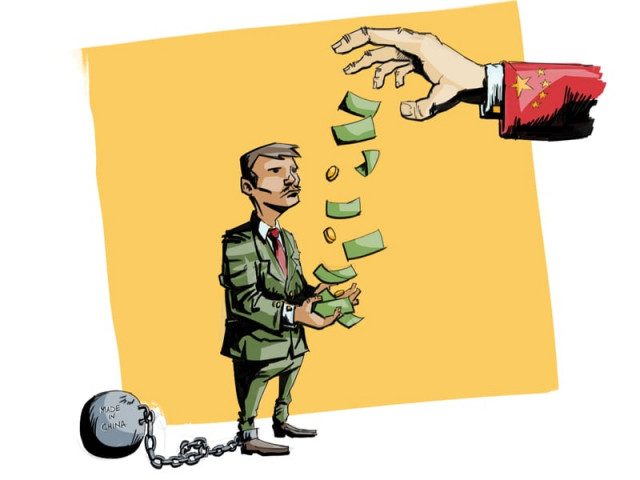Money out of nowhere: SBP utilises Chinese currency swap agreement to shore up reserves
Central bank still has a few tricks up its sleeve to delay going to the IMF.

“Use of the Chinese trade financing facility should not be perceived as help from a friendly country. This is a loan Pakistan will have to return,” says an official. ILLUSTRATION: JAMAL KHURSHID
Pakistan has availed a Chinese trade financing facility in a bid to shore up its rapidly depleting foreign currency reserves, following a large loan repayment to the International Monetary Fund (IMF) which dented its ability to finance external trade.
“Use of the Chinese trade financing facility should not be perceived as help from a friendly country. This is a loan Pakistan will have to return,” explained an official who spoke on the condition of anonymity.
There has been a net increase of $190.8 million in the total liquid foreign currency reserves held by banks in the country. Pakistan’s total foreign currency reserves increased to $11.623 billion by May 24, according to the latest data issued by the SBP, despite a $385 million payment to the IMF made by Islamabad in the preceding week.
Reserves held by the State Bank of Pakistan (SBP) increased to $6.564 billion, higher by $181.8 million. The SBP’s reserves are inclusive of the $2.7 billion that it has booked in forward contracts. Commercial banks’ reserves have also increased by $9 million to reach $5.1 billion.

The exact amount of the financing received could not be immediately ascertained, but SBP spokesperson Inayat Hussain more or less confirmed that the increase in reserves is largely because of a currency swap arrangement with China. The development is contrary to market expectations, courtesy the SBP’s unusual decision to utilise a currency swap arrangement to build reserves.
The agreement became operational fairly recently, after it was ratified by Pakistan and China in an effort to promote bilateral trade and investment and strengthen financial cooperation. The three-year agreement was originally aimed at facilitating traders from the two countries.
Sources said Pakistani authorities had requested China to activate the credit line after it witnessed a sharp dip in its foreign exchange reserves. The SBP has now withdrawn Chinese currency and converted it to dollars to shore up its reserves, they added.
“The problem with this arrangement is that the country will have to return the loan in Chinese currency after three years. It will then use the dollars it holds to buy yuan back from the market, which will have a direct impact on reserves,” sources explained. The Government of Pakistan will have to pay mark-up on the borrowed sum at a rate higher than the Shanghai interbank market rate, meaning that this will be an expensive undertaking.
Industry insiders have long suspected that China will convert the arrangement into a loan, as it had expressed scant interest in trading in Pakistani currency since the early stages of the deal. They said China had refused to deal in Pakistani currency when Pakistan first proposed the arrangement to Beijing.
Unlike in 2008, when China deposited $500 million with the SBP to shore up Pakistan’s reserves, China has not yet expressed any explicit desire to bail Islamabad out of the mess the latter finds itself in.
So far, the incoming PML-N government does not seem willing to negotiate a deal with the IMF for at least another three or four months despite the obvious problems in external financing. Sources said it is also negotiating with Saudi Arabia for a two-year furnace oil facility on deferred payment worth $5 billion.
Analysts see the increasing tendency to seek help from ‘friendly countries’ an attempt to avoid unsavoury reforms that the IMF will force on Pakistan as a precondition to any fresh bailout programme. Sources said the Obama administration will likely not ask the IMF to take a lenient view, given present circumstances, and that Pakistani authorities will be pressed to take certain corrective measures before they even consider formally approaching the Fund.
Published in The Express Tribune, May 31st, 2013.
Like Business on Facebook to stay informed and join in the conversation.



















COMMENTS
Comments are moderated and generally will be posted if they are on-topic and not abusive.
For more information, please see our Comments FAQ